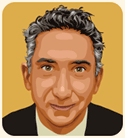Diplomacy during the Cold War, wrote Sam Tanenhaus in last Sunday’s New York Times, may have been more of a high wire act than a chess match—but diplomacy, neither then nor now, is a tug of war.
Unfortunately, that’s the way it’s being conducted in the U.S.’ delinked Cuba-Venezuela policies—hostages to age-old vendettas, anachronistic policies and the persistent failure to develop policy in the hemisphere through a broader geostrategic lens.
In this case, our ability to play a larger, more constructive role in the deteriorating political situation in Venezuela is being held back by our utter lack of leverage over Cuba.
Since Hugo Chávez took the oath of office in 1999, the former lieutenant colonel’s Bolivarian Revolution has been a beneficiary of Cuban intelligence and planning services that have helped the movement reorganize the intelligence services, gut the electoral council and create community militias (the now-infamous colectivos).
According to some sources, there are over 40,000 Cubans currently in Venezuela, including doctors, sports trainers (sports trainers?) and advisors.
In return, former President Chávez and his successor, Nicolás Maduro, have provided around 100,000 barrels of oil a day at concessionary rates to the cash-strapped, struggling Cuban economy, half of which the government re-sells on the international market for hard currency. According to a recent Financial Times article, should the bottom fall out on the Venezuelan government, the loss of that payment for Cuban services would provoke a decline of 8 percent of Cuban gross domestic product.
The path to Venezuela lies through Cuba. Raúl Castro and the Cuban government will help the Maduro government hang on until the bitter end. That’s not sinister; it’s basically national interest.
Unfortunately, the U.S. has ceded any role in Cuba—and thus, in Venezuela—to the rest of the hemisphere, as a result of its 52 year-old internationally unpopular efforts to isolate the Cuban government and the Castro brothers. As a result, in both cases, the newly aspirant regional power, Brazil, has stepped in to fill the breach. (A case in point: former President Lula was in Cuba last week, and presidential foreign policy guru Marco Aurélio Garcia traveled to Venezuela this week.)
Let’s be real (politic) here: the legitimate national interest and security threat to the United States right now is Venezuela, not Cuba.
Fifteen years of chavismo in Venezuela have created a black hole of weak institutions that have produced one of the highest murder rates in the world, a frighteningly polarized country seemingly on the edge of widespread violence, and a toxic nexus between narcotraffickers and sectors of the government.
No such similar risk exists in Cuba, as much as some try to grasp at straws to justify its remaining on the state sponsors of terrorism list. (Why? Because Cuba has given refuge to a 1970s Jersey cop killer? Because, during the Colombian peace talks—which the U.S. supports—federally indicted FARC guerrillas have taken up residence there? Please.)
There is the argument that Cuba is advising the Venezuelans and that indirectly or even directly they are responsible for the 17 deaths (and growing) of demonstrators. Whether or not that is true, we have no leverage with the Cuban government, and very little with the Venezuelan government to get them to pull back or hold those responsible accountable—and tragically, I don’t see the international or regional community stepping up to ensure accountability.
And here, Russian President Vladimir Putin’s attempts to manipulate Ukrainian domestic politics and threaten Crimea and other eastern states is illustrative. Many have compared Putin to the Castros (laughable for many reasons). What is often ignored is that the only hope of getting Russia to pull back, short of open conflict, is the threat of economic sanctions from the U.S., from the E.U. and particularly from Germany, which represents a large share of its trade.
Already, the ruble has tumbled and its markets are weak. If anything will force a re-calculation of the former KGB agent’s revanchism, it will be the economy.
If only we had those strings in Cuba—a country much more tied to the fate of the Maduro government—and potentially, to the strings of any alternative economic support. But we don’t. In fact, we don’t have any sway. So the Cubans dig in and Brazil fills the void.
One last point: none of this denies the human rights stakes in either country, nor implies that it will be easy. In fact,quite the opposite.
But after 52 years of an embargo that has failed to improve human rights in Cuba and that has isolated the U.S., the most effective, direct and logical route to human rights and protecting the U.S.’ legitimate security and regional interests lies in doing more than pulling harder in the same direction.
Support AQ! “Like” our Fall 2013 issue cover here.



